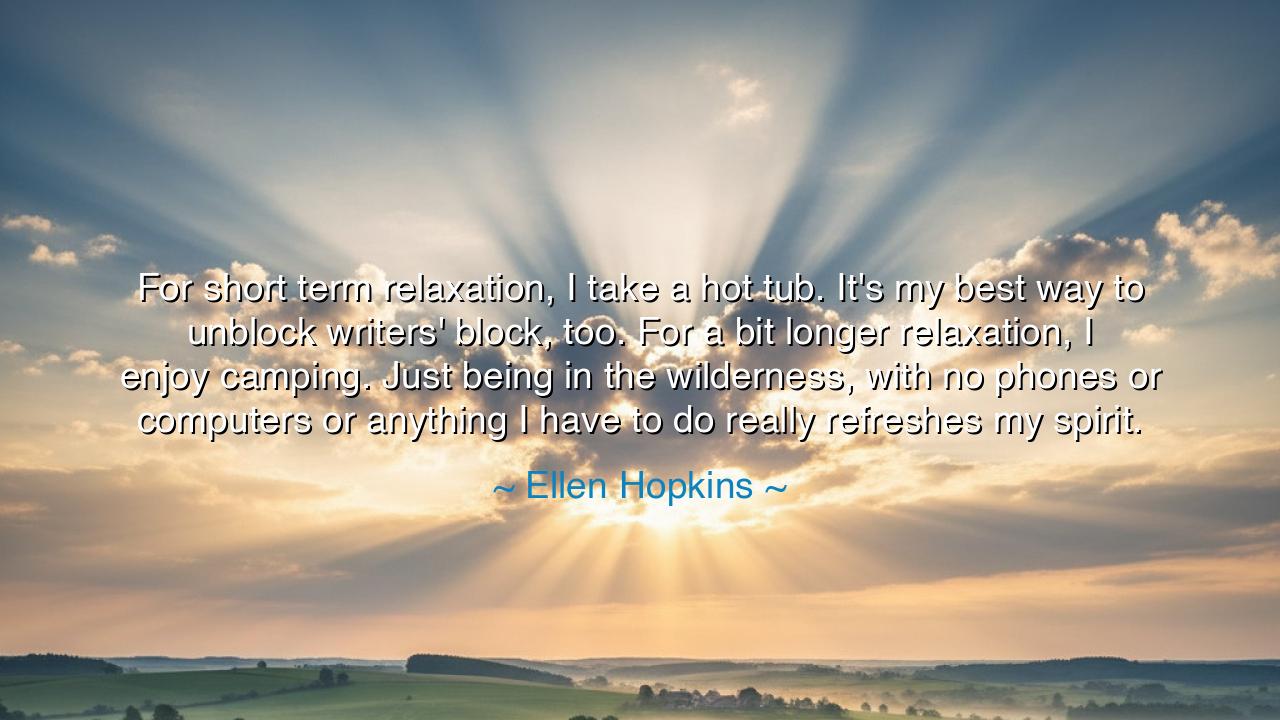
For short term relaxation, I take a hot tub. It's my best way to
For short term relaxation, I take a hot tub. It's my best way to unblock writers' block, too. For a bit longer relaxation, I enjoy camping. Just being in the wilderness, with no phones or computers or anything I have to do really refreshes my spirit.






“For short term relaxation, I take a hot tub. It’s my best way to unblock writers’ block, too. For a bit longer relaxation, I enjoy camping. Just being in the wilderness, with no phones or computers or anything I have to do really refreshes my spirit.” — in these heartfelt words, Ellen Hopkins, the poet and storyteller of raw truth, speaks of something both ancient and eternal: the renewal of the human spirit through simplicity, silence, and communion with the natural world. Her confession, gentle and practical, hides within it a lesson that philosophers and mystics have preached for centuries — that rest is not idleness, and that the mind, like the body, must sometimes return to stillness to awaken its own strength.
Hopkins’ reflection reveals an understanding born not of luxury, but of necessity. As a writer, she lives in constant dialogue with her own thoughts — shaping, wrestling, and refining them until they form truth on a page. Yet even the creative flame must pause to breathe. The hot tub, with its heat and motion, symbolizes that intimate form of renewal — a short retreat, a momentary surrender to calm. It is her ritual of unblocking, her way of releasing tension so that inspiration may flow again. In this, she echoes the wisdom of the ancients, who knew that clarity often comes not through force, but through relaxation — that the mind, when unbound from strain, finds its natural harmony once more.
But Hopkins does not stop at the surface; she journeys deeper — into the wilderness, into the heart of creation itself. There, far from the tyranny of screens and obligations, she finds a longer, deeper kind of peace — the kind that restores not just the mind, but the soul. “No phones or computers,” she says — and in those few words lies an act of rebellion against the fevered pace of modern life. To be in nature is to remember that existence is not made of deadlines and noise, but of sky and wind, of breath and silence. For her, the forest becomes a cathedral, and solitude a sacrament.
This love for wilderness has ancient roots. The Stoics of old — Seneca, Epictetus, Marcus Aurelius — often withdrew from the city’s noise to reflect among the hills and seas. They knew that man must sometimes step outside of civilization to see it clearly. Likewise, in Eastern thought, the Zen masters taught that stillness and clarity arise when one sits quietly within nature — observing without striving, listening without expectation. Hopkins, though a poet of the modern world, speaks the same truth: that the wilderness cleanses the spirit of its artificial burdens and returns it to its original rhythm.
Her words also carry a subtle critique of the world we have built — one where constant connection has severed true connection. To live “with no phones or computers,” as she describes, is to recover a sacred balance. The body, long bent over screens, straightens. The eyes, long starved of horizon, rediscover distance. The heart, long tethered to noise, finds stillness again. Hopkins reminds us that to disconnect from the world of devices is not to abandon life, but to reconnect with life’s essence — the wind, the stars, the murmur of leaves, the breath of our own being.
There is also a deeper, more creative truth within her confession. The writer’s block she speaks of is not unique to writers — it is the stagnation of the human spirit when overwhelmed by too much doing and too little being. In her hot tub and her wilderness, Hopkins practices what the sages once called the art of renewal — stepping away not to escape, but to return with greater clarity and vigor. For the well of creation refills itself not through constant drawing, but through stillness, patience, and surrender to the flow of life.
The lesson, then, is this: do not fear the pause. Whether you are a writer, a dreamer, or a worker of any kind, remember that the mind, like the soil, must lie fallow before it can bloom again. Seek your “hot tub” — your small ritual of restoration — and seek also your “wilderness,” where the deeper renewal dwells. Let go of the noise, the endless demands, and return to the quiet places that refresh your spirit.
So remember, O seeker of meaning — rest is not retreat, and silence is not emptiness. In the still water and in the whispering woods, life waits to remind you who you are. As Ellen Hopkins teaches, it is not through endless striving that we create or live well, but through balance — through moments of stillness that give the soul room to breathe, and through the simple grace of listening once more to the quiet voice of the Earth.






AAdministratorAdministrator
Welcome, honored guests. Please leave a comment, we will respond soon